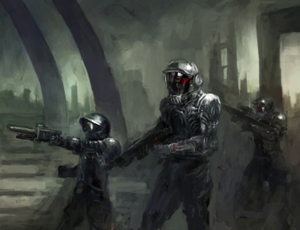
Major Allyn Kilmacher, Galactic Republic space engineer, activated the Intracranial Communications Port (ICP) behind his ear. A sudden, fleeting wave of vertigo. The ICP, surgically implanted years ago, had grown nerves into and alongside Allyn's brain, enabling non-verbal communication between Allyn and his Muse. The small Muse Computer, nicknamed "Mouse," was perched, barely visible, atop Allyn's shoulder.
"Mouse, you there?" thought Allyn.
"I'm here, Allyn. What's up?" thought Mouse.
"I'm gonna get killed."
"Very funny. Another inept, biological attempt at humor?"
"No, you worthless slab of silicon. I need a data dump on Space Vikings, fast."
 "Give me a second. Hmm, Space Vikings: legendary adventurers. Three-hundred-year history. Descended from a Galactic Republic Expedition that went rogue in 2150 under the brilliant leader Stanley 'Buck' Rogers. Created faster-than-light propulsion that the republic declared bogus. Ordered his return to Earth in disgrace. He rebelled and set out on a solo voyage."
"Give me a second. Hmm, Space Vikings: legendary adventurers. Three-hundred-year history. Descended from a Galactic Republic Expedition that went rogue in 2150 under the brilliant leader Stanley 'Buck' Rogers. Created faster-than-light propulsion that the republic declared bogus. Ordered his return to Earth in disgrace. He rebelled and set out on a solo voyage."
Mouse continued. "The Galactic Republic sent a battle cruiser, the GRS Endeavor, but Rogers and crew easily outran it, left Earth's solar system, were presumed lost and declared legally dead a decade later. But, for 300 years, as the Galactic Republic expanded, there were hints Rogers and descendants had survived and were operating in deep space. In 2350, a hundred years ago, contact was again made."
"What were the hints?"
"They were naughty boys—planets reduced to cinders, crushed civilizations, radioactive debris, rumors of fierce warriors, Vikings ravaging without pity. Over time, Vikings mastered other skills. For example, they genetically modified themselves, adapting to space travel. Today's Vikings still travel to secret, frightening places but prefer wampum to weapons. Prolific traders. The republic depends on the Vikings to supply essential materials."
Allyn responded, "They sound like tough guys."
"They're 'robust' and deadly. Humans who accompany Vikings survive less than a year. So, what's your mission?"
![]() Allyn took a deep breath. "During construction of their latest starship, the Galactic Republic apparently sold the Vikings a malfunctioning positron generator. They're mad as hell and headed this way, hauling unobtanium the republic desperately needs. They won't deliver until the generator's repaired. No one in the galaxy can do the repair, so the republic's sacrificing me."
Allyn took a deep breath. "During construction of their latest starship, the Galactic Republic apparently sold the Vikings a malfunctioning positron generator. They're mad as hell and headed this way, hauling unobtanium the republic desperately needs. They won't deliver until the generator's repaired. No one in the galaxy can do the repair, so the republic's sacrificing me."
"Who's 'they'?"
"Colonel Belvedere."
"The infamous Belvedere who has hated you since you were classmates at the Space Academy?"
"The same. Belvedere's got it all—family, house, car, wife, clothes and an insider's career path to the very top. Plus, an ego to match. He's the one who sabotaged my career to conceal his incompetence in dealing with the Algorian System."
"Too bad. Maybe you can reason with the Vikings?"
"Last guy who tried came back minus a tongue. The republic needs unobtanium, and politics demands a sacrifice. I'm the sacrifice. Belvedere said I'll go down as a great patriot—posthumously."
Allyn moved to the viewport. Only pinpoints of light were visible against the void. A Viking starship emerged from deep space. Allyn had heard about the sight but was unprepared for the sheer majesty of the sudden transformation. Brilliance overwhelmed: a massive, silver ship instantly visible, twisting like a sailboat heaving-to beneath a golden, luminescent gossamer sail that filled the heavens with palpable golden waves of energy coursing across vast stretches of space-sail, ricocheting from its perimeters and back again. The fabric spiked, driven by charged particles, umbra and penumbra rebounding in space. Then, more ships emerged, wave upon wave, sail beyond sail, ship succeeding ship until heaven was blocked by the convergence. The room grew warm with radiant heat. Gradually, the scene dimmed, losing luminescence, shading to brass, to copper, by degrees fading, embers in a sky of perpetual night.
Up close, the Viking ship was larger than Allyn had perceived, its bulk receding into a gray distance. Heavily armed soldiers marched Allyn and Mouse along vast hallways, across labyrinths of intersecting passages, and through grottoes filled with vast stores of equipment and weaponry. Allyn gagged on stagnant, humid air.
"Smells like a hibernating hotha," thought Mouse.
Allyn grunted.
The admiral was impressive, mentally and physically. His thallium blaster swung menacingly on his hip, evidence of wear suggesting he knew how to use it. Scars laced his rippling muscles.
"I don't enjoy being duped," he said, smashing a meaty fist. "And I expect the Galactic Republic to send qualified people. If you're not, I won't take it well. By 'not take it well,' I mean they'll have to inter you in shoeboxes. Your little computer friend here? He won't have brains enough left to bag a job as a fuel dispenser at a space-truck stop. So, one chance. Any idea what's wrong with our positron generator?"
"I know what's wrong," answered Allyn. He blinked, shocked at his words. Mouse had goaded him with subliminal override.
The admiral looked hard. "Aren't woofin', are ya? If you're a funny guy, please note, I'm not laughin'."
Mouse was communicating on emergency channels, his thoughts blasting so strongly that Allyn couldn't think for himself. He began retransmitting Mouse's thoughts, converting impressions into cogent, spoken arguments.
"My Muse is communicating with your ship's computers."
"What's that mean?"
"You're using old technology—obsolete 10th-generation RFIDs, limited capacity, needed replacement long ago. Nevertheless, you aren't effectively using even that limited information. All modern construction equipment archives operational environments, comparing maintenance schedules, for example, against what's actually performed. Clearly, ship maintenance hasn't met minimal requirements for proper operation."
"One moment," said the admiral. He summoned an aide and whispered in his ear. "Continue," said the admiral.
"Your other problems are more fundamental," said Allyn, echoing Mouse's thoughts.
"They are?" thought Allyn. "Mouse, what are you getting me into?"
"Trust me," thought Mouse.
The discussion was interrupted by the crack of a whip from a nearby corridor, followed by screams.
"What's that?" asked Allyn.
"We've initiated 'a dialogue' with our former chief of maintenance. Now, tell me more about my ship."
It was too late to back out. Allyn and Mouse began integrating thoughts, laying out a convincing tale.
"Admiral, the Viking navigation is superb, but you're hitting a technological wall.
"What?"
"Basic philosophical questions. What are intelligence and creativity? Are there physical limits to miniaturization? The Galactic Republic wrestled with these issues 100 years ago. We were in a technological blind alley. In design and construction, we couldn't leverage our greatest inventions."
"'You're speaking gibberish!"
"Admiral, the Viking exploits are impressive, but, when talking technology, you're on my turf. Two centuries ago INTEL recognized that there are limits to the information compressible into a given space. Historically, we'd increased computing power by making things smaller. We reached a break point where smaller was impossible.
"You're still speaking gibberish."
"I'll say it another way. We'd confused information storage and retrieval with intelligence. They're completely different. Genius isn't storage—it's recombining information in new ways. It's creativity. That's what we'd missed by concentrating on raw computing power."
"So?"
"Biological brains aren't born with information ready to access. Instead, they come with flexible capacity to organize structure as they learn. Biological brains reflect the very definition of learning—learning occurs when behavior changes. Storage and retrieval of information are static, so you never progress to a higher level. Progression requires change."
As Allyn talked, a light came on in the admiral's eyes.
"INTEL began to develop devices in a fundamentally different way. They eventually developed 'technological neoteny,' which allows undifferentiated, 'immature' internal structures to modify themselves and structure their own development in response to the stimuli they receive. This allowed INTEL devices to mimic biological brains, which have an established geography corresponding to functional responsibility, but with an internal architecture that's undifferentiated. Where a biological brain governs vision, for example, it does so because it's physically connected by the optic nerve to the eyes. The brain receives a stimulus and responds—automatically—to that stimulus by structuring itself, organizing itself, and defining and performing its function, without preprogrammed instruction. 'Critical developmental periods' are a manifestation of this innate process because organization, structure, learning and thinking are inherently stable and self-fulfilling prophecies when the appropriately fertile blank slate and sufficient stimuli coincide. The problem you've encountered with the positron generator is that you have a smart device connected to a dumb system. Therefore, you can't construct smartly."
"Remarkable," said the admiral. "I get it. We, the Vikings, have to adapt, and we have things to learn from the Galactic Republic. I'm convinced that humans could add value to our ship. I want to add you to my crew."
Allyn was shocked, but he and Mouse quickly exchanged thoughts. "I'm of too low a rank to properly represent someone of your exalted station," said Allyn quickly.
"Who's the right guy?" asked the admiral.
"I have exactly the right guy in mind," said Allyn. He's from one of the best Earth families, rose quickly in the organization and has all the right contacts in all the right places—a star. His name? Colonel Belvedere."

Walker Lee Evey, a past president and CEO of the Design-Build Institute of America, is widely known as the program manager for the Pentagon Renovation, a 10-year, $4-billion construction program that was on the verge of cancellation when he helped turn it into an award winner. His task ultimately included oversight of the Phoenix Project, the construction surge that allowed the Pentagon to recover in only one year from the Sept. 11, 2001, terrorist attack.
To see all of the Construction Science Fiction stories, click here.

Post a comment to this article
Report Abusive Comment